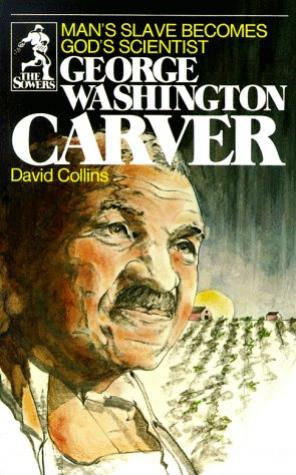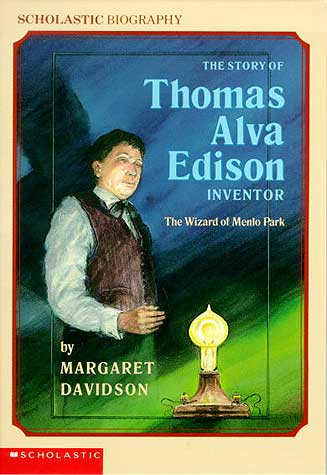Tom started school. The schoolmaster, Mr. Engle, had a terrible temper. He didn't like children very much. Most of all, he didn't like Tom Edison, who asked so many questions.
One day Mr. Engle lost his temper. "Tom Edison", he thundered, "all you do is ask silly questions. There is nothing I can do with you--your brains are addled!"
When Mrs. Edison heard what the schoolmaster said, she was angry. Addled! Weak in the head! Her son was not addled. But she could not say as much for Mr. Engle!
Mrs. Edison took Tom out of school. She would teach him herself. Tom never went back to school. In all his life, Thomas Edison spent only three months in school.
Tom Edison didn't go to school, but he was a great reader. He read all kinds of books. When Tom was nine he read a science book. It told about chemicals and carbons and electricity. Electricity. How Tom loved that word. This book changed Tom's life. He decided to become an inventor.
Excerpt from The Story of Thomas Alva Edison Inventor, pps. 13-14, by Margaret Davidson.
When Thomas Edison reached 12 years old, he needed money for his science books and experiments. He went to work on a train, leaving his home in Port Huron every morning at seven o'clock. He sold newspapers on the Detroit express, along with molasses candy, apples, sandwiches, and peanuts. He made money, but not enough for his books and experiments.
What could he do to earn more money? Tom thought about this for some time. Then he had an idea. He would put out his own newspaper. He would write it, and print it, and sell it.
But where could he work? There was plenty of room in the baggage car on the train. Tom bought an old printing press and put it in the baggage car. And he started to work--writing, printing, and selling copies of his own newspaper, The Weekly Herald.
Tom didn't spell very well. Sometimes he forgot to put periods at the end of his sentences. So they ran on and on and on. But people bought his newspaper. They liked the stories in The Weekly Herald. And Tom's spelling made them laugh.
Excerpt from The Story of Thomas Alva Edison Inventor, pg.16, by Margaret Davidson.
We read this Thomas Edison biography in our homeschool this week. The book is short, simplistic, and written for a younger audience than my boys' current ages. It expounds on Edison's questioning nature, his hard work, and his pioneering technology, but it speaks nothing of his heart. Perhaps Sonlight chose it merely to inspire students to believe in themselves, to work hard, and to think outside the box?
Finding the book lacking, I read more extensively on my own this week and found that Thomas Edison was a practical atheist, and in some respects he was mean-spirited. Now I see why Sonlight chose such a simplistic book to portray him. They didn't want to leave him out of the historical survey, but they also didn't want children to admire some of the more selfish, unbalanced aspects of his life and heart.
Thomas Edison offered George Washington Carver, God's Scientist, $100,000 dollars a year to come invent with him. "Together, we will change the world," said Edison. One of Edison's fancy-suited assistants went down to the university and presented Professor Carver with the proposal.


But Carver? He was a man after God's own heart, and I think he knew Edison wasn't. Also, God had plans for Carver to continue to bless his people through crop education. Carver fought poverty and gave glory to God by teaching the South--and the rest of the world--how to cultivate food.
Edison? He fought for patents and became a very rich man. Carver made $3,500 a year as a professor, and he didn't even cash most of his checks. He had no use for money, he said; God provided everything he needed for free.
Henry Ford, the motor-vehicle inventor, was a friend to both men. I am curious to know how Henry felt about the Lord? He befriended a fellow inventor who gave God the glory for everything, and another who thought mostly of himself. What did Henry Ford make of these men? I want to know more....
Simple though it was, this Thomas Edison biography spoke to me as a homeschooling mother.
I'm so grateful to be educating at home.
Staying home to disciple and educate my children is worth every feminine skirt I can't buy, every fancy dish I'll never own, every trip to Washington D.C. we'll never take, every hair cut I won't get, every clean and stylish throw rug our floors won't see.
God has taught me value...true worth. My children are free to live and laugh and think outside the box. They don't have to conform to what an overly-busy teacher--concerned about test scores--expects from them six hours a day. They have many hours a week to spend reading and interfacing with ideas. They have time to experiment, to invent, to play.
This week alone they invented a new card game, a boat that floats, and they thought outside the box to use their toys in new ways.
They pretended to be real train operators on the playroom couch, marking their destinations on a US map they drew up. They announced each city stop as they pulled up to the "station".
My Peter still doesn't begin all his sentences with capital letters--yes, he knows the rules--and although his spelling is improving greatly, it isn't entirely conventional yet. He can't print well without a dotted line.
But he devours books and talks about his ideas.
And he dreams.
He dreams of soil experiments, of beautiful gardens, of the natural pesticides he'll invent. He dreams of crops and harvest time. He dreams of family working alongside him. He dreams of bouncing babies on his knees and reading the Bible to his family.
There's so much more to an education than the schooling. Just as cleanliness is not next to godliness, proper punctuation and instantaneous retrieval of multiplication facts are not the gold standard of a great intellect. If they have to think for five seconds, that's okay. If they always need another draft, that's okay.
Thomas Edison didn't spell well at age 12? Oh, well. Spelling proficiency isn't indicative of a sharp mind. By the end of high school most well-read children will spell well enough. I do spelling lessons most days of the week, but sometimes I don't know if my son is improving in spite of them, or because of them.
Thomas Edison's intellect and aspirations weren't limited to what a teacher thought of his skills, thank goodness.
"My mother was the making of me. She was so true, so sure of me; and I felt I had something to live for, someone I must not disappoint."
As homeschooling mothers we mustn't get distracted by skill acquisition. Skills are merely a means to an end. Our goal is a well-trained mind--one that first meditates on Him and on His Creation. The mind is a gift to be stretched--to be exercised by the meditation of ideas and the solving of problems.
Educating our children should be about exposing them to all of God's gifts. For hasn't God given us what we need for fulfillment, both through relationship with Him and through Creation? In his graciousness, he's held nothing back.
Here are a few gifts to share with our children:
~ The gift of beauty in the natural world--flowers, trees, rivers, lakes, mountains, insects and other animals.
~ The gifts of the arts and the written word--music, painting, sculpture, dance, novels, poetry.
~ The gift of natural resources for our basic needs and for ingenious invention.
~ The gift of patterns around us--in math, in art, in music.
No, I don't admire Thomas Edison's heart, but I see how his mother did right by him.
"My mother was the making of me. She was so true, so sure of me."
- Teach them to go to the only source of Truth--to measure everything against God's standard.
- Believe in your child's potential.
- Set your gaze on what she can do.
- Don't be the anxious teacher, bent on checking off skill-mastery.
- Be the inspiration for a mind that's always stretching.
- Clear the calendar to allow time for nothing, which really means, give them time to invent and explore and play. A too-busy schedule is not the father of creativity, but the killer of it.
- Let them make messes.
- Let them fail and start again.
- Champion their God-sized dreams.
- Buy few toys and stick with classics. Pre-made toys, like commercial entertainment, can stunt the imagination.
- Teach them not to remember facts, but to acquire the tools of learning.
- Teach them to ask questions and find answers.
- Teach them that God has provided more than enough for their physical and spiritual fulfillment, and if they covet more, let it be more love in their hearts, not more things. The acquiring of things is a waste of the time God so graciously gives.
- Teach them that the world rarely chases what is good, and that God provides an abundance of good, all for free.
- Teach them that sin ruins and holiness blesses.
- Teach them that God's love never ends, that his faithfulness never wanes, that his comfort is ever-present...just a quiet time away.
- If traditional school crowds out the time you need to teach all these things, then follow Mrs. Edison's advice and think outside the box. Get rid of the school.
Ecclesiastes 7:12
For the protection of wisdom is like the protection of money, and the advantage of knowledge is that wisdom preserves the life of him who has it.
Proverbs 9:10
The fear of the Lord is the beginning of wisdom, and the knowledge of the Holy One is insight.
Deuteronomy 11:19
You shall teach them to your children, talking of them when you are sitting in your house, and when you are walking by the way, and when you lie down, and when you rise.
Romans 12:2
Do not be conformed to this world, but be transformed by the renewal of your mind, that by testing you may discern what is the will of God, what is good and acceptable and perfect.
Proverbs 4:13
Keep hold of instruction; do not let go; guard her, for she is your life.
Proverbs 16:16
How much better to get wisdom than gold! To get understanding is to be chosen rather than silver.
More on what the Bible says about education here.
1 comment:
Oh, the many advantages of home schooling! We could never exhaust the list. :) Keeping you all in my prayers, dear friend. Much love to you.
Post a Comment